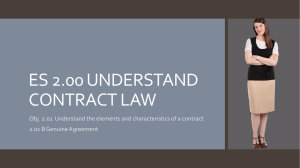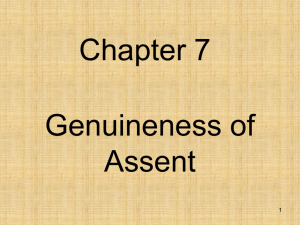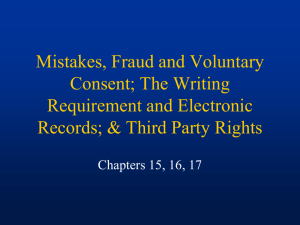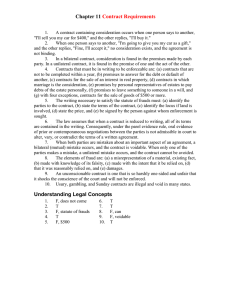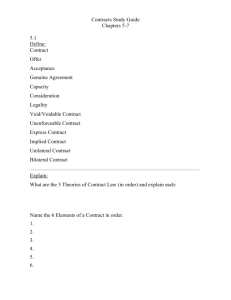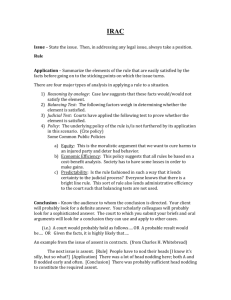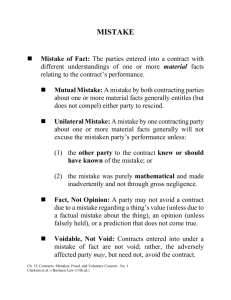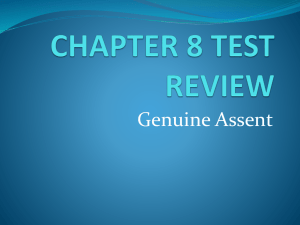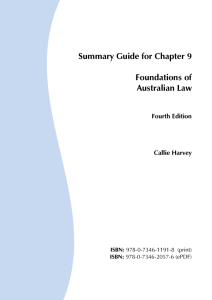genuineness of assent - Olivet Nazarene University
advertisement
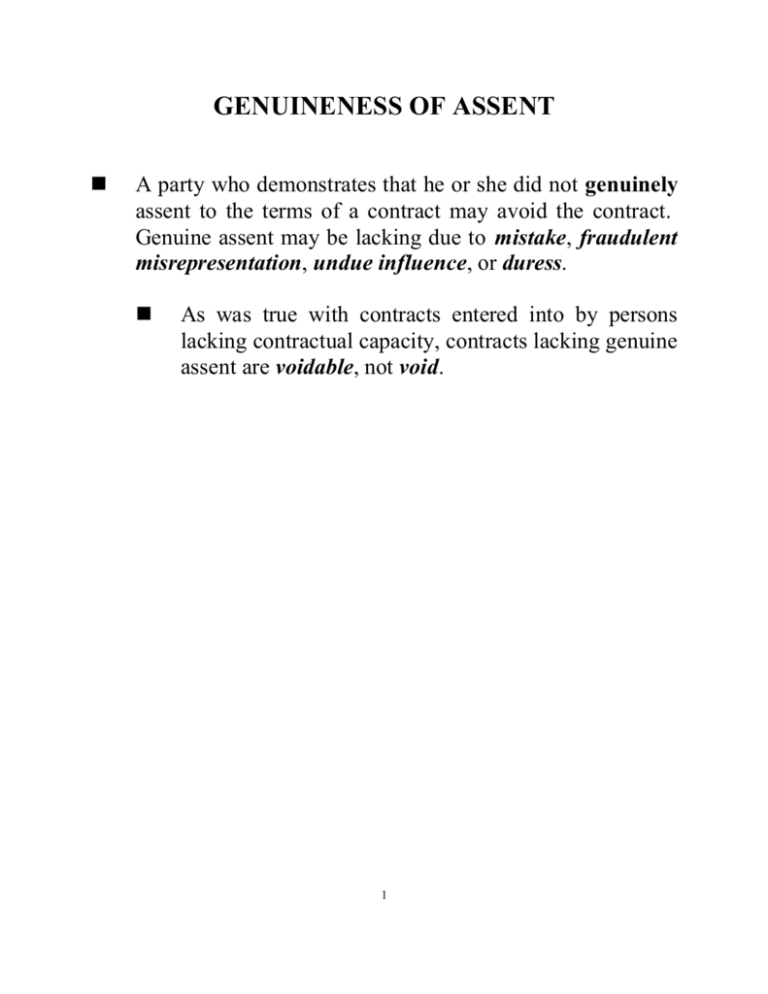
GENUINENESS OF ASSENT n A party who demonstrates that he or she did not genuinely assent to the terms of a contract may avoid the contract. Genuine assent may be lacking due to mistake, fraudulent misrepresentation, undue influence, or duress. n As was true with contracts entered into by persons lacking contractual capacity, contracts lacking genuine assent are voidable, not void. 1 MISTAKE n Mistake: The parties entered into a contract with different understandings of one or more material fact(s) relating to the subject matter of the contract. n Unilateral Mistake: A mistake made by one of the contracting parties. Generally, a unilateral mistake will not excuse performance of the contract unless: (1) the other party to the contract knew or should have known of the mistake; or (2) the mistake is one of mathematics only. n Mutual Mistake: A mistake on the part of both contracting parties. Either party may rescind the contract when both parties are mistaken about the same material fact. If instead, the mutual mistake concerns the market value or quality of the object of the contract, either party can enforce the contract. 2 FRAUDULENT MISREPRESENTATION n When a party unknowingly consents to a contract with fraudulent terms, he or she may usually avoid the contract, because he or she did not genuinely assent to the fraudulent terms. n Elements of Fraudulent Misrepresentation: (1) A misrepresentation of material fact was made (through words, actions, or failure to disclose serious defects), (2) with the intent to deceive, (3) on which the innocent party justifiably relied, (4) resulting in injury to the innocent party. n Most courts do not require proof of an injury to the innocent party if the only remedy sought by the innocent party is rescission of the contract -- that is, returning the parties to their pre-contractual positions. n However, in order to recover damages, it is universally held that the innocent party must prove injury as a result of the misrepresentation. Punitive damages may be awarded to punish. UNDUE INFLUENCE AND DURESS 3 n n Undue Influence arises from relationships in which one party can influence another party to the point of overcoming the influenced party’s free will. n The essential feature of undue influence is that the party being influenced does not, in reality, enter into the contract of his or her own free will. n Undue influence can arise from the following types of relationships: attorney – client; doctor – patient; guardian – ward; parent – child; husband – wife; and trustee – beneficiary. Duress: Forcing a party to enter into a contract because of the fear created by threats. While a party forced to enter into a contract under duress may choose to perform the contract, duress is grounds for cancellation, or rescission. Economic grounds are generally not sufficient to constitute duress. 4 THE STATUTE OF FRAUDS n Statute of Frauds: A statute, which requires certain types of contracts to be in writing in order to be enforceable. n Although the Statute of Frauds vary somewhat from state to state, the following types of contracts must be in writing to be enforceable: (1) contracts for the sale or lease of, or a mortgage on, real property (e.g., land, fixtures); (2) contracts that cannot, by their terms, be performed within one year after the date the contract was formed; (3) collateral contracts, such as promises to answer for or guaranty the debt or duty of another person (Note: “Main Purpose Rule exception”); (4) promises made in consideration of marriage (i.e., prenuptial agreements); and (5) contracts for the sale of goods valued at $500 or more. 5 THE STATUTE OF FRAUDS: EXCEPTIONS n Exceptions to the Statute of Frauds: A contract, which might otherwise be unenforceable because it is not in writing, may be enforced to some degree as follows: n Partial Performance: If a buyer has taken partial possession of real or personal property and paid that part of the contract price attributable to the property received, and if the parties cannot be returned to their pre-contractual positions, a court may order that the remainder of the contract be specifically performed -that is, performed according to the precise terms of the contract. n Under the Uniform Commercial Code, an oral contract is enforceable to the extent that the seller has accepted payment or the buyer has accepted delivery of the goods covered by the oral contract. n Promissory Estoppel: If a promisee justifiably relies to the promisee’s detriment, the promisor may be estopped from denying the existence and validity of the contract. n Admissions: If the party against whom the enforcement is sought “admits” in court proceedings. THE STATUTE OF FRAUDS: 6 SUFFICIENCY OF THE WRITING n A written contract, signed by both parties, satisfies the requirements of the Statute of Frauds. What else will suffice? n A writing signed by the party against whom enforcement is sought (usually the defendant); n A confirmation, invoice, sales slip, check, or fax, or any combination thereof; or n Several documents which, in combination, provide the terms for an agreement. n An agreement does not need to be signed at the bottom, but may be signed anywhere on the agreement; moreover, initials will suffice where there is no signature. n The writing(s) need only contain the essential terms of the contract: name of the parties, subject matter, quantity, and consideration. n Whether price is an “essential” term depends on the type of contract in question. 7 THE PAROL EVIDENCE RULE n Parol Evidence Rule: A substantive rule of contract law under which a court will not admit evidence of the parties’ prior negotiations, prior oral or written agreements, or contemporaneous oral agreements if that evidence contradicts or varies the terms of a written contract. n Integration: The determination of whether parol evidence will be considered revolves around the court’s determination of whether the written contract is integrated -- that is, if it constitutes the final expression of the parties’ agreement. 8 THE PAROL EVIDENCE RULE: EXCEPTIONS n Courts have recognized numerous exceptions to the operation of the parol evidence rule. In addition, there are certain statutory exceptions, which apply to contracts under the Uniform Commercial Code. Among the betterestablished exceptions are the following: n Evidence of subsequent modification; n Evidence of mistake, fraud, or misrepresentation in the formation of the written contract; n Evidence which may resolve an ambiguity and/or fill in a missing term or condition in the written contract; n Evidence of prior dealing between the parties, usage of trade in the relevant locale and/or trade, and course of performance under the contract by the parties; n Evidence of an oral condition precedent to the written contract; and n Evidence of an obvious or gross clerical error. 9
